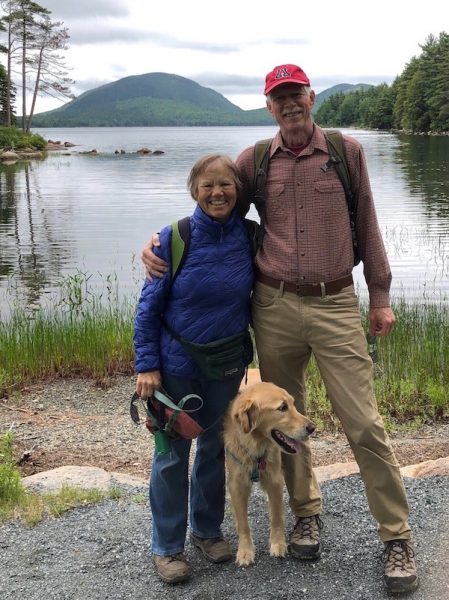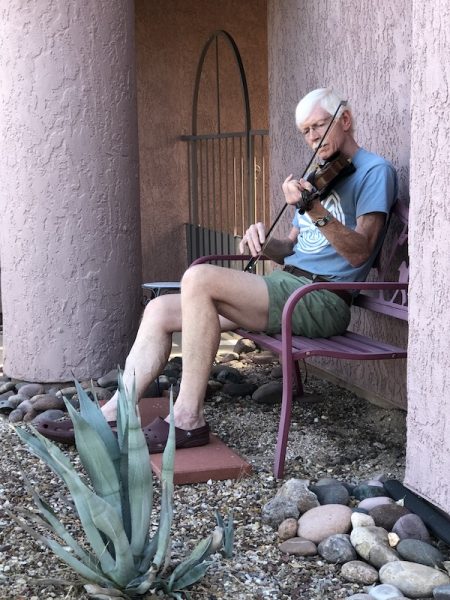For 37 years, until he retired in 2015, Dr. Fred Craigie was a full-time faculty member at the Maine-Dartmouth Family Medicine Residency in Augusta. He is a clinical psychologist and taught behavioral health for residents and students and provided behavioral health care to a largely underserved primary care population. Currently, he is a Visiting Associate Professor at the Andrew Weil Center for Integrative Medicine (AWCIM) at the University of Arizona College of Medicine.
Dr. Craigie is passionate about the role that spirituality can play in everyone’s life, but particularly in health care. He teaches and writes extensively about “the healing and life-giving roles of spirituality in health and patient care, in the experience of health care providers, and in the life and culture of healthcare organizations.” You can learn more about his work on his blog Goodness of Heart.
I met Dr. Craigie in 2018 at the 32nd Annual Thomas Nevola MD Symposium on Spirituality and Health at Colby College in Waterville, Maine. He was the symposium chair and invited me to be on a panel about the value of public discourse and the need for many voices. I also attended his presentation on The Inward Work of Civil Discourse, which was about “looking at our own thoughts, feelings and attitudes so we are emotionally and spiritually able to engage in respectful conversations with other people or, for that matter, to think and speak about people we are never likely to meet.”
Oh, my, couldn’t we all benefit from such a presentation at the current moment? I stayed connected with Dr. Craigie after the symposium because I signed up to receive his email reflections, which I look forward to every week. Here’s a recent one:
The things that matter most in our lives are not fantastic or grand. They are moments when we touch one another, when we are there in the most attentive or caring way. This simple and profound intimacy is the love that we all long for.
Jack Kornfield
I think the work Dr. Craigie does matters a great deal and am grateful that he agreed to take the time to write about how he has been affected by the pandemic and the challenges it presents. He wrote this from his winter home in Tucson, Arizona where he and his wife are hunkered down until they believe it is safe for them to return to Maine.
Thanks to Diane for the invitation to contribute to this dialogue about how we make our ways through the pandemic. I am touched and inspired by the other postings.
For me, as for so many people, it has been a challenging and disheartening time. As I write this, there have been close to 300,000 deaths world-wide, over 80,000 of them in the United States. I grieve for the people who have been lost, and for their loved ones, who remain. My heart goes out to the 20 million people who have lost jobs here, many with a very uncertain future. As a semi-retired professional person, I’m making out fairly comfortably, but I worry for all of the people who don’t have the luxury of staying or working at home, and I worry that the pandemic seems destined to further strain the economic inequality that has been growing for many years. I am appalled by what I see as an unconscionable lack of accountability, integrity, and human compassion at the highest level of our government.
None of this, of course, is within my control.
I remember, however, the comment of American essayist Rebecca Solnit, speaking about activism, to the effect that even if you don’t profoundly change the world if you “embody what you aspire to… if you live according to your beliefs… you have already succeeded.”
It makes for an interesting exercise. What do I aspire to? What are the beliefs that I would hope to embody? If criticize somebody else for a lack of accountability, integrity, and compassion, how do I express these qualities? In my teaching and writing, I talk a lot about what is “sacred” for people, and what it means “to live a good life.” What are my answers to such questions, in these extraordinary times?
I don’t have a single, over-arching response, but here are some things I’m doing to try to be faithful to the questions.
I love my wife. I wake up every day with the thought of what might being her joy, and I am blessed that I think she wakes up this way with the same thought for me.
I do my best to be a grandparent at a distance. With the younger grandchildren, this means being silly together. With older ones, it’s more organized, as with 9-year-old Henry, with whom I am corresponding back and forth, writing a story together, The Great Blorb Revolution! It’s his title, his characters, and our combined narrative, evolving email-by-email.
I write letters to legislators and contribute to electoral campaigns of candidates who look to bring people together, rather than driving them apart.
I jog. I’m not going to set any land speed records, but at my age, it’s less about split times than nurturing body and soul in one package.
I practice fiddle. Soldier’s Joy. Rights of Man. Moonlight on the Water. Maybe, with a dedicated chunk of practice time, I can take it to the next level. Or maybe not.
I keep up my semi-retirement work, finishing editing on my second book, due in the fall, and teaching online at the Andrew Weil Center for Integrative Medicine. I am learning to ZOOM.
I laugh.
I reach out to people in my life with whom I don’t have much regular contact, in a spirit of “How are you doing?” I am gifted that people reach out to me in this way, as well.
I support local business.
I eat a little too much ice cream and not enough fruits and vegetables. My wife, however, reminds me that guilt probably harms one’s health more than the moderate indulgence of many of the things we feel guilty about.
I spend a little time on hobbies. Taking apart, cleaning and trying to reassemble an 1870s clock movement has to help prevent Alzheimer’s, right?
I read. At the moment, it’s Eric Larson’s The Splendid and the Vile, the story of Winston Churchill’s forthright, uplifting moral leadership during the Battle of Britain.
I sometimes kick back and do nothing productive, and I remind myself that this is OK.
I practice gratefulness, looking for the small gifts and blessings, taking to heart the observation of my friend, Dr. Robert Emmons, that “In times of trial and tribulation, gratitude becomes our spiritual lifeline.”
There. That’s some of what I do. May you who are reading this be safe and well, and may we together come out of this with an even deeper appreciation for being, for each other, the people that we aspire to be.
Frederic Craigie, PhD
Thank you, Dr. Craigie and may you and your wife also stay safe and well.



Leave A Comment